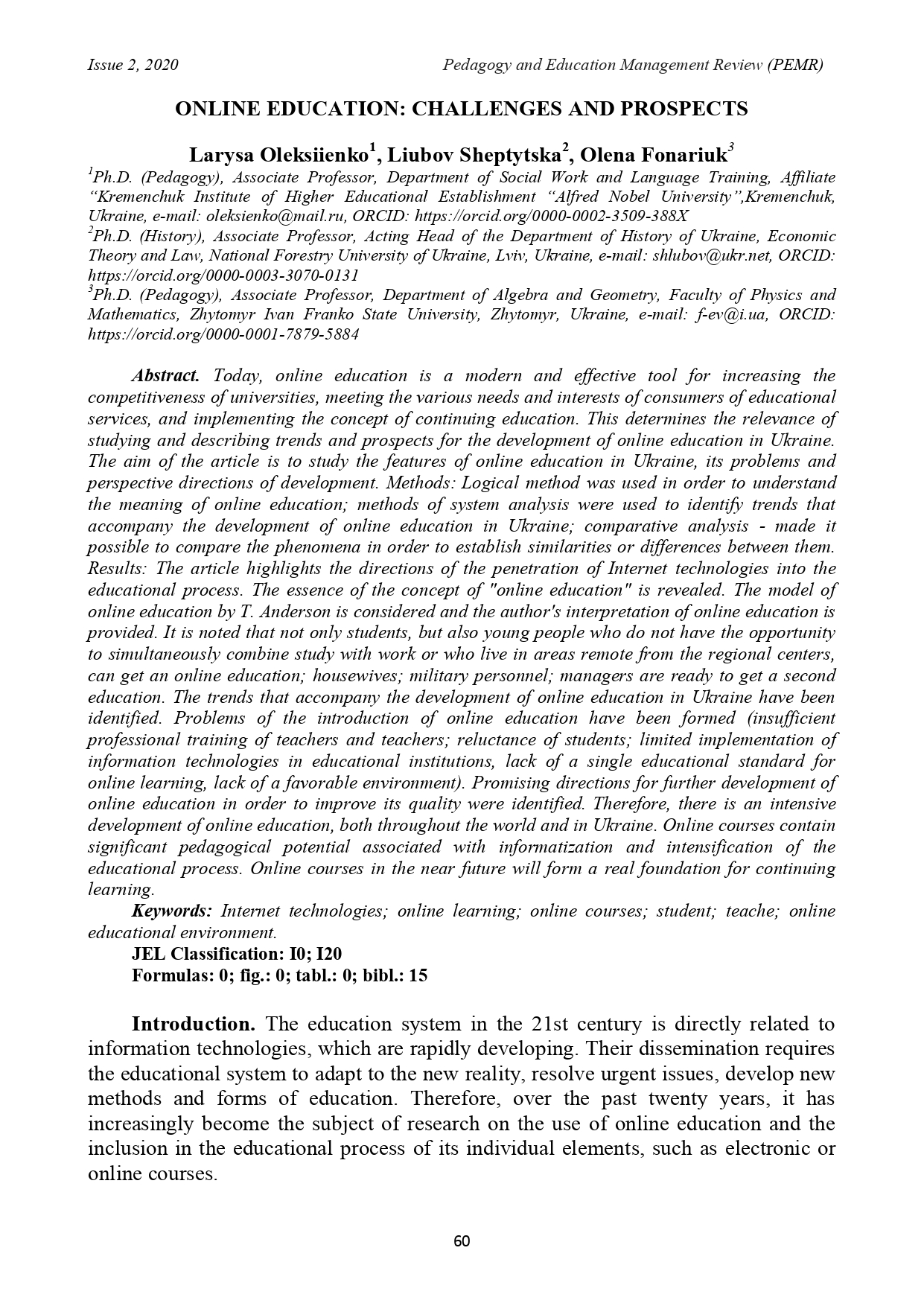ONLINE EDUCATION: CHALLENGES AND PROSPECTS
DOI:
https://doi.org/10.36690/2733-2039-2020-2-60Keywords:
Internet technologies, online learning, online courses, student, teacher, online educational environmentAbstract
Today, online education is a modern and effective tool for increasing the competitiveness of universities, meeting the various needs and interests of consumers of educational services, and implementing the concept of continuing education. This determines the relevance of studying and describing trends and prospects for the development of online education in Ukraine. The aim of the article is to study the features of online education in Ukraine, its problems and perspective directions of development. Methods: Logical method was used in order to understand the meaning of online education; methods of system analysis were used to identify trends that accompany the development of online education in Ukraine; comparative analysis - made it possible to compare the phenomena in order to establish similarities or differences between them. Results: The article highlights the directions of the penetration of Internet technologies into the educational process. The essence of the concept of "online education" is revealed. The model of online education by T. Anderson is considered and the author's interpretation of online education is provided. It is noted that not only students, but also young people who do not have the opportunity to simultaneously combine study with work or who live in areas remote from the regional centers, can get an online education; housewives; military personnel; managers are ready to get a second education. The trends that accompany the development of online education in Ukraine have been identified. Problems of the introduction of online education have been formed (insufficient professional training of teachers and teachers; reluctance of students; limited implementation of information technologies in educational institutions, lack of a single educational standard for online learning, lack of a favorable environment). Promising directions for further development of online education in order to improve its quality were identified. Therefore, there is an intensive development of online education, both throughout the world and in Ukraine. Online courses contain significant pedagogical potential associated with informatization and intensification of the educational process. Online courses in the near future will form a real foundation for continuing learning.
Downloads
References
Vorobieva, T.A. (2014). On the concept of e-learning. Ideas and ideal, 2, 143-152.
Deinega, I.O. (2018). Online education in the development of the information society. Black Sea Economic Studies, 30-1, 78-82.
Dereza, O.O., Sklyar, R.V. & Dereza, S.V. (2020). Online learning methods. Improving the educational process in higher education: a collection of scientific and methodological works, 82-90.
Kirsanova, E.V. & Chernenko, V.I. (2012). On the question of distance education. Bulletin of the Association of Universities of Tourism and Service, 3, 79-86.
Kryzhanivska, V.I. (2016). Features of introduction of e-learning technologies in higher education of Ukraine. Social technologies: current issues of theory and practice, 69-70, 205-215.
Mamatov, D.N. (2015). E-learning in education. Lifelong learning, 13, 12-16.
Navolochnaya, Yu.V. (2014). Features of control in e-learning. Pedagogy and psychology of education, 4, 51-54.
Opanasyuk, Y. (2016). Distance learning as a consequence of the evolution of the traditional education system. Higher education in Ukraine, 1, 49-53.
Osetsky, V. & Tatomir, I. (2017). The role of mass open online courses in the modern "educational landscape". Ukraine economy, 12 (673), 86-98.
Romanovsky, O.G., Kvasnyk, O.V., Moroz, V.M., Pidbutska, N.V., Reznik, S.M., Cherkashin, A.I. & Shapolova, V.V. (2019). Factors of development and directions of improvement of the distance form of education in the system of higher education of Ukraine. Information technologies and teaching aids, 6, 20-42.
Khalikov, A.A. & Musamedova, K.A. (2013). Analysis of distance learning methods and implementation of distance learning in educational institutions. Rostov n / D.
Shabanov, G.A. (2017). Pedagogical problems of quality assurance of online education. Higher education today, 5, 11-15.
Anderson, T. (2011). The theory and practice of online learning. 2nd Edition. Edmonton, AB: AU Press.
Danver, S.L. (2016). The SAGE encyclopedia of online education. Thousand Oaks, California: SAGE Publications Inc.
Horn, M.B. & Staker, H. (2014). Blended: Using disruptive innovation to improve schools. San Francisco, CA: John Wiley & Sons.






